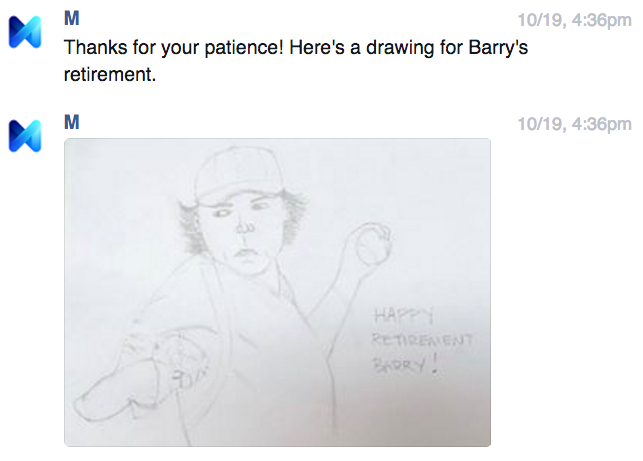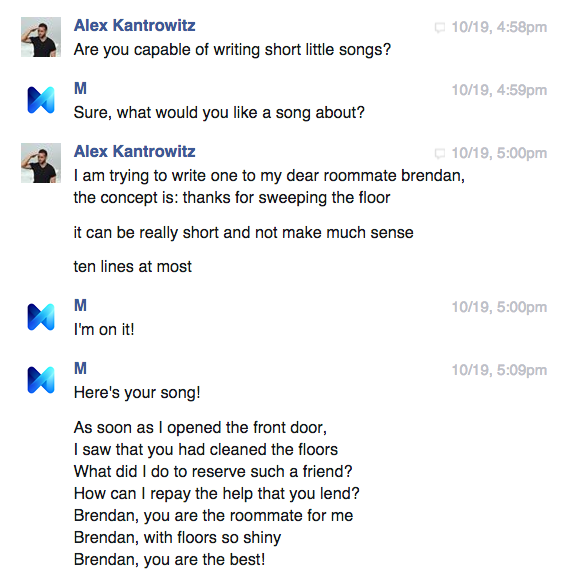There’s this thing I’ve been doing pretty often over the past week. A couple of times each day, I put a closed fist to my temple, pause for a moment, and slowly extend all five fingers while saying the words: “Mind. Blown.”
Since Thursday, October 15, I’ve been one of the few people in the world with access to “M,” the virtual assistant Facebook is in the process of building into its Messenger app. M responds to all manner of requests -- even ones that you'd assume it wouldn’t be able to answer, with a combination of artificial intelligence and human touch. It will surprise and delight with the lengths it’s willing to go to make your life easier. It may even blow your mind.
Last Tuesday, for instance, I was in the car with my boss when he recalled the frustration he experienced trying to reserve a ticket to the opening night of the new Star Wars movie. Three hours on Fandango, he said, and no tickets. So I sprang into action. “Want me to ask M?” I offered. I put in the request and, six minutes later, M came back with the tickets: Four of them, as requested — to a 3D showing at the theater he wanted, at the time he suggested. I hit “get,” per M’s instructions, and asked M to email me the tickets and copy him. A minute after I sent over my email address, the tickets were in our inboxes.
We live in a world where giant companies are being built on the promise of making things more efficient and, by extension, more convenient. Hit a button and you get a cab. Hit two and you’re renting a room in someone else’s house. Go to Amazon and buy your next stereo instead of going to the store.
M takes this to the next level. Over the past few days, I asked M to find and book me a cheap flight to New York, to plan an itinerary for myself and a friend to watch the Mets in the World Series in person (too expensive), to monitor game and flight tickets and alert me if they drop in price, to get me a refund on a streaming package after it stopped working (success!), to find a bar close to a concert venue, and to shop the internet for products and buy me the ones with the lowest prices. (For Amazon purchases, M claims it will ship them to you for free via Amazon Prime, regardless of whether you are a Prime member or not.) It doesn’t stop there. Every morning at 7 a.m., M sent me a story about the New York Jets; it also sent updates on Mets’ slugger Yoenis Cespedes’ health. It sent me four messages so I wouldn't forget my backpack at the end of the concert. Last Wednesday, I told M I had a bad day and asked it to send me something nice. It responded with a photo of a bulldog overlaid with text: “Cheer up buttercup, I’m here to make your day better.”

When I asked M to wish San Francisco Giants pitcher Barry Zito a happy retirement, it told me it could not reach out to humans, so I asked it to draw a picture of Zito and write “Happy Retirement Barry!” And by god, it did:

M does have its limits. When I asked it to draw Mark Zuckerberg atop a volcano fending off fire-breathing pterodactyls with a Facebook flag, it refused. Unprompted, it put me on the volcano instead with nary a Zuckerberg or Facebook logo in sight. When I asked M to sign its masterpiece, it refused, but later conceded, scribbling out an "M" on the sketch — Facebook is clearly still working out the boundaries around this stuff. M also declined to summon an Uber, and to sell my bike on Craigslist. Beyond that, it performed exceptionally well.
M actually did so well that it was often hard to tell whether I was interacting with a human or a bot. Some of my interactions with the service — the drawings, for example — were undeniably human; others, like the 7 a.m. Jets link, seemed likely to be AI. And that’s an interesting wrinkle. To scale M to Messenger’s 700 million users, Facebook needs to strike a pretty nuanced balance, quickly determining whether a query can be answered with AI or requires human intervention. The company will also need a contingency plan in case the AI stumbles — if it confuses Richmond, Virginia, with Richmond, California, for example, or is asked to book a flight with a stolen credit card.
If Facebook makes M available to all Messenger users, it will also have to decide which of the fully human parts of M to keep. How will Facebook ever scale a service like this? It’s hard to imagine M drawing daily pictures for 700 million people, but minimizing that sort of magical “AI” feature could make it less compelling.

Facebook has said little about the business objectives of M -- “We don’t currently make any money from M, and we don’t have anything to share about future plans,” a Facebook spokesperson explained in an email -- but it’s easy to see why the company would invest in a product like this. M keeps you inside Messenger when you visit, and brings you back when you leave. It enhances Messenger with a potentially very addictive feature.
M is also remarkably adept at spending your money. With M's help, I spent about $709, suggesting the service could someday be attached to some promising e-commerce deals. And it’s wildly addictive; when a glitch prevented me for using it for a few days, I was legitimately bummed out. Who wouldn't want an ever-present assistant around to help them out throughout the day?
M is also remarkably adept at spending your money.
M is undoubtedly an expensive endeavor, but it's also one that could pay off with big rewards should it be widely embraced by people who use it to shop. “As you're aggregating all that demand, it puts you in a very powerful position to monetize intent or transactions, whether it's reservations at a restaurant or flight booking or food orders,” Navid Hadzaad, CEO of virtual assistant venture GoButler, told BuzzFeed News. GoButler already takes a commission on the flights and hotels it books and from some other transactions.
The hypothesis makes some sense, and the proposition will become more interesting as people spend more time on mobile devices. Most mobile time is spent in-app, not in-browser, making services that sit on top of the web, like Google Search, less dominant. Virtual assistants like M, which plug directly into the apps we already use, could conceivably fill whatever void may open up -- which is exactly what their creators are betting on.

“What Google is to you on your desktop is what a digital assistant is going to be for you on your mobile,” Hadzaad said. “This is the future of search on mobile devices.”
If Hadzaad is right, then what we’re starting to see in M and other products like it may be a shifting of power from the search bar, a gusher of internet riches, to the virtual assistant. If the shift does indeed happen, Facebook is in position to capitalize thanks to its built-in userbase and early start.
Without question, these assistants will make your life easier, but they will also give tech companies a much deeper understanding of your identity. Facebook already knows your birthday, friend list, and much more; with M it could soon know when you wake up, where you like to sit on airplanes, what movies you see, and whether you prefer road or mountain bikes. That’s a lot of information to entrust to Facebook, which has a long and storied history of privacy missteps, so M is best approached with caution and common sense. That said, excuse me while I ask M to plan out my evening.
